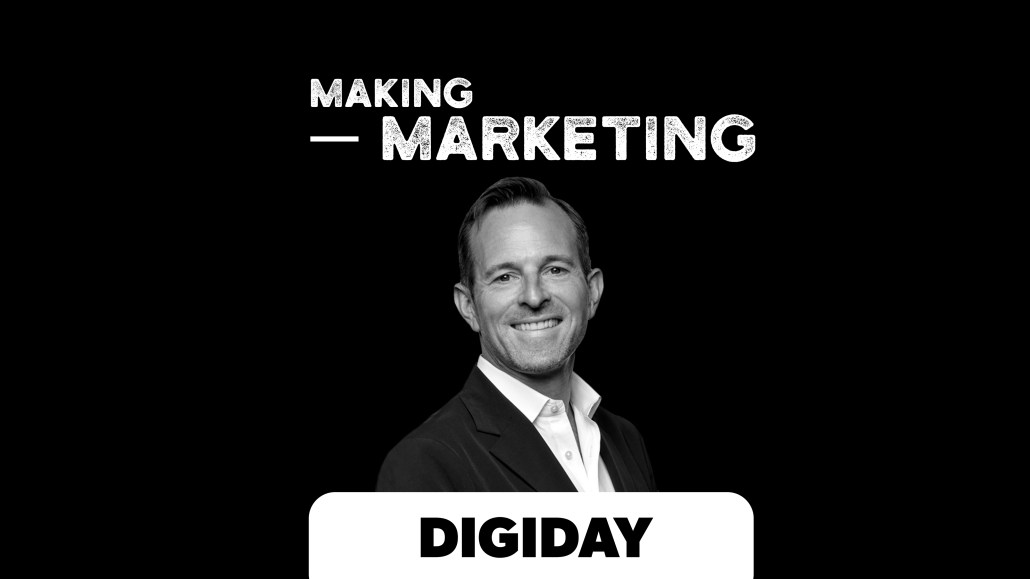Save 50% on a 3-month Digiday+ membership. Ends Dec 5.
MedMen’s David Dancer: Regulations need to catch up with the business of cannabis

Subscribe: iTunes | Google Play | Stitcher | RSS | Anchor
Cannabis has gone from being stigmatized by society to now capturing the imagination of retailers, investors and consumers. MedMen, a publicly traded company out of California, is at the forefront of the developing cannabis industry. Standing in the way of its retail strategy are big hurdles like hyperlocal compliance issues, inconsistent regulations that differ state by state and the stigmatization associated with cannabis itself.
“We’re grounded in an education focus, at first coupled with branding and then customer acquisition for MedMen,” said David Dancer, the newly appointed CMO at MedMen, on this week’s episode of Making Marketing. “We’re one of the first companies who is doing the type of marketing that we are in terms of resources — print, audio, out of home and digital. One of the biggest challenges is when media outlets say no to working with cannabis.”
In our latest podcast, Dancer talks about hyperlocal marketing, working with influencers and figuring out cannabis marketing. Edited highlights below:
The challenges in marketing cannabis.
“In banking, there’s a set of rules to follow. You’re allowed to do national marketing. The regulations for cannabis are state by state and sometimes, county by county. The complication is the positioning and the creative. There [are] very different rules with different subsets of locations. We have a large compliance and legal team. They help us navigate the regulations so that we can be on message and visually have the right creative to comply with these regulations. We are leading the way from a marketing perspective in the cannabis industry.”
Make your own content.
“We have two areas of focus from a content perspective. We partnered with Paper magazine, and we published our own quarterly magazine, Ember. It is printed and also on our website. We allow Paper magazine to drive the editorial. It’s a real opportunity for us to talk about how Cannabis plays a role in pop culture today. We’ve needed to find ways to create content and ways of content distribution. We’ve hired a programmatic agency, and we’ve found really great success in working with publishers either directly or digital programmatic testing. We view ourselves as a premium retailer. With our branding and focus on changing the dialogue around cannabis, we tend to shy away from the traditional cannabis media and don’t participate in that. We want to focus on the new cannabis consumer, stress reduction, wellness.”
Ad position: web_incontent_pos1
Working with influencers.
“We found that micro-influencers are effective for us. We’re not able to send product to folks. We have a lot of restrictions around how we work with those influencers. So we are able to encourage them to go into the store, engage with the store and then talk about their experience. Celebrities may have relationships with networks that prevent them from participating. We’re building a database of influencers and celebrities who are pro-cannabis and are interest in talking about it. We’re learning who will be and is interested in having a conversation with us.”
Hyperlocal marketing is good marketing.
“The first priority for us to make the [retail] experience consistent state by state. What prevents us from doing that is regulation and acquisition and build out of our store. If we purchased a store, we may be in a state where the store is in pop-up mode; it’s not fully integrated with the MedMen brand. Every store is designed with the same tones, technology, interactive and educational material. But in California, we can have product that customers can touch and interact with. But in Nevada, all product has to be in closed and locked cases. Our marketing in each store varies, we have to customize and tailor that. But ultimately good retailers do have customization of marketing at the local level. We’re a hyperlocal marketer from the retail perspective.”
More in Marketing

Ulta, Best Buy and Adidas dominate AI holiday shopping mentions
The brands that are seeing the biggest boost from this shift in consumer behavior are some of the biggest retailers.

U.K. retailer Boots leads brand efforts to invest in ad creative’s data layer
For media dollars to make an impact, brands need ad creative that actually hits. More CMOs are investing in pre- and post-flight measurement.
Ad position: web_bfu




